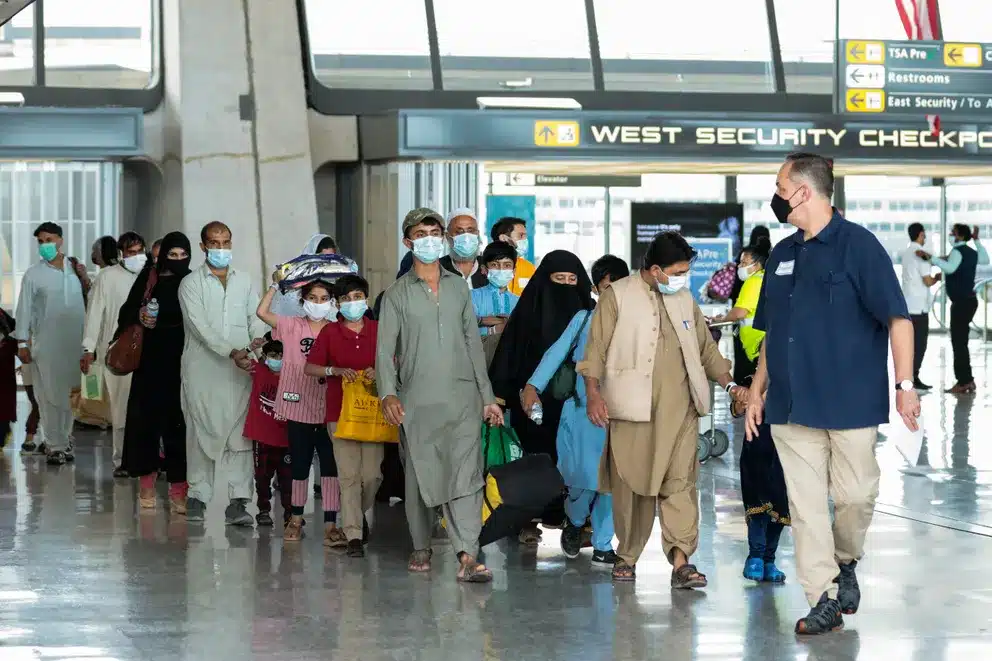In a dramatic escalation of immigration policy, President Donald Trump signed a new proclamation aimed at restricting travel to the United States from nearly 20 countries, citing elevated national security concerns and non-compliance with immigration standards.
The move, announced on June 4, 2025, institutes a full ban on entry for nationals of twelve countries, including Afghanistan, Myanmar, Chad, Congo, Equatorial Guinea, Eritrea, Haiti, Iran, Libya, Somalia, Sudan, and Yemen. Additionally, partial restrictions now apply to seven more nations — Burundi, Cuba, Laos, Sierra Leone, Togo, Turkmenistan, and Venezuela.
While the policy is sweeping, officials emphasized that it includes key exceptions. Lawful permanent residents, existing visa holders, certain visa categories, and individuals whose presence serves a U.S. national interest will not be affected. The administration insists that this is not a blanket travel ban but a strategic response to ongoing cooperation failures and national security gaps.
Each country was flagged for specific issues, ranging from terrorism affiliations and civil unrest to alarmingly high visa overstay rates.
In Afghanistan, the Taliban — a group the U.S. designates as a Specially Designated Global Terrorist entity — retains de facto control, and the country lacks both a functional passport authority and proper identity verification systems. A staggering 29.3% of Afghan students and exchange visitors overstayed their visas, according to recent Department of Homeland Security data.
Similarly, Myanmar has drawn criticism for its high overstay rates — 27.07% for standard travel visas and over 42% for student visas — and for its refusal to repatriate citizens flagged for deportation. Chad raised red flags with nearly half of its short-term travelers failing to return home, suggesting what the proclamation called “a blatant disregard for immigration laws.”
Even countries with longstanding diplomatic relations weren’t spared. Haiti, for example, was cited for lacking a centralized police or criminal justice system and having a 31% visa overstay rate among business travelers. Iran and Cuba, both designated as state sponsors of terrorism, were criticized for refusing to cooperate with U.S. law enforcement and for not accepting deported nationals.
For other nations, the problem lies in instability and lack of governance. Libya, Somalia, and Yemen all continue to operate without functioning central governments. Somalia is described as a terrorist safe haven, while Yemen has been the site of active U.S. military operations since early 2025.
The proclamation also noted alarming statistics from countries like Equatorial Guinea, where over 70% of student visa recipients failed to leave the U.S. as scheduled, and Eritrea, which refuses to provide criminal records or cooperate with deportation proceedings.
The Trump administration insists the decision is data-driven and reversible. Nations that make meaningful progress in securing their borders, issuing reliable travel documents, and cooperating with U.S. authorities may have restrictions lifted in the future.
To minimize confusion and airport chaos, the order will go into effect at 12:01 a.m. on Monday, June 9, 2025 — offering a short grace period to ensure a smooth transition. Officials said they learned lessons from the 2017 travel ban rollout, which caused widespread disruptions at international airports.
Beyond this new policy, the State Department has also updated its “Do Not Travel” advisories, adding North Korea to its Level 4 risk category. The warning is explicit: “Do not travel to the Democratic People’s Republic of Korea for any reason.” U.S. passports are not valid for travel to North Korea unless granted a rare exemption by the Secretary of State.
The advisory warns of the risks of arrest, prolonged detention, and the U.S. government’s limited ability to assist detained citizens. Sweden continues to serve as the U.S. protecting power in Pyongyang, but access to American prisoners is often blocked.
The scope of the State Department’s Level 4 list has expanded in recent months to include 21 countries, with persistent warnings for war-torn or politically volatile regions such as Syria, Ukraine, Iraq, Venezuela, and Russia. Countries like Mali, South Sudan, and the Central African Republic remain on the list due to terrorism and civil unrest.
Other nations, including Uganda and Mexico, remain under heightened scrutiny. Uganda’s travel advisory was updated in April 2025, raising concerns over violent crime and its controversial Anti-Homosexuality Act. The advisory warns U.S. citizens of targeted harassment and urges LGBTQ+ travelers in particular to take extreme precautions.
Meanwhile, Mexico’s security risks continue to be handled on a state-by-state basis. Six states — including Colima, Guerrero, and Michoacán — remain under “Do Not Travel” guidance due to cartel violence, kidnappings, and frequent clashes with law enforcement. Several others, like Jalisco and Sonora, are listed under “Reconsider Travel” due to similar threats.
In contrast, states such as Yucatán and Campeche are considered relatively safe, with no heightened precautions needed — though U.S. travelers are still advised to avoid night driving and exercise vigilance, especially in rural or less-policed areas.
While the sweeping travel proclamation and advisory updates are drawing criticism from immigration advocates and foreign policy experts, the Trump administration continues to argue that these are necessary steps in a world increasingly defined by unpredictable threats and rising instability.
The message is clear: if other nations want to see these travel restrictions lifted, they must meet the U.S. on terms of security, cooperation, and accountability. Until then, the door remains partially — or entirely — closed.






